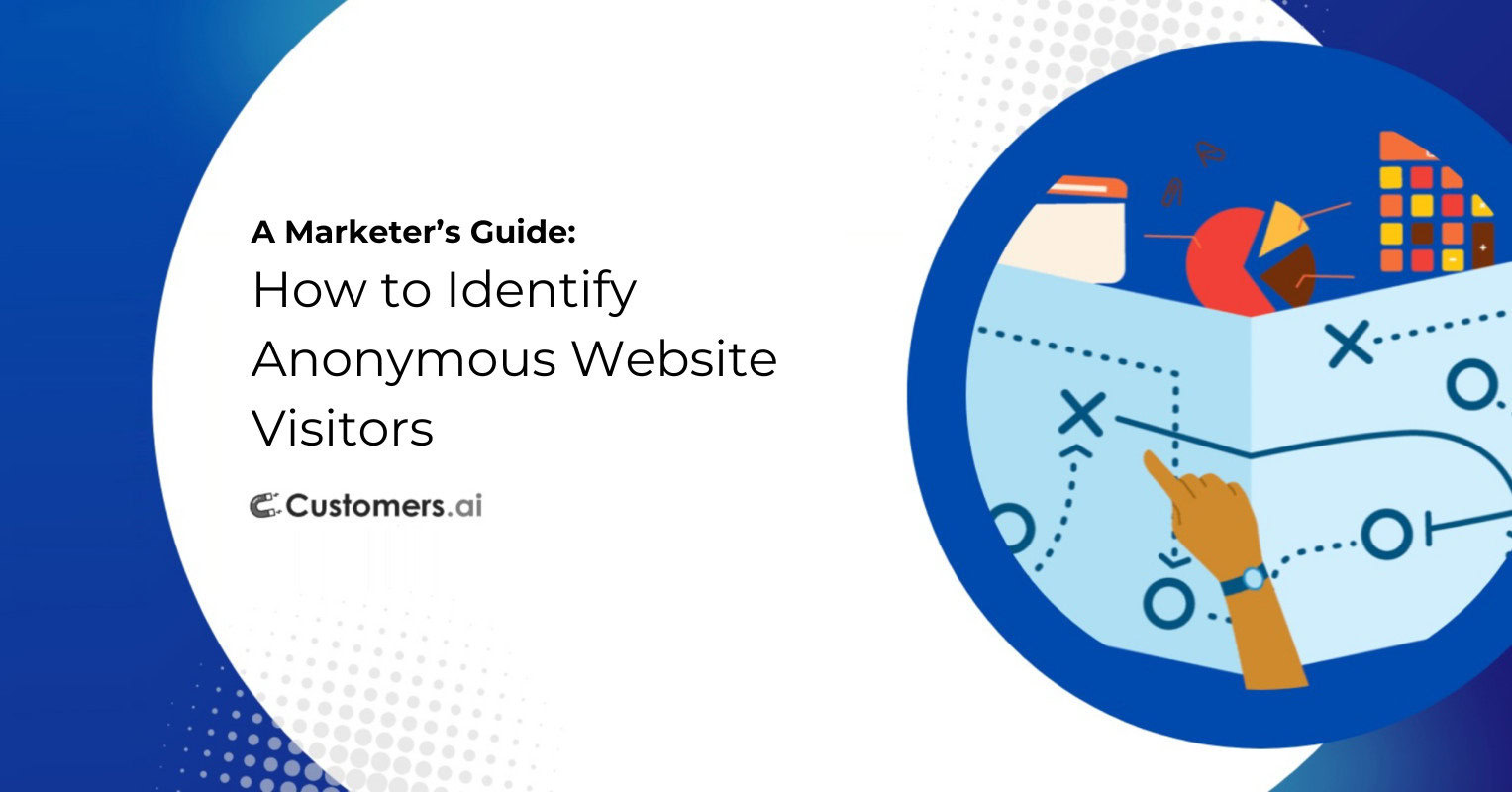Consider this: on average, nearly 98% of website visitors remain anonymous, navigating through product and offer pages, engaging with content, yet leaving no trace of their identity.
For marketers, understanding who your website visitors are and what they want is crucial to making smart marketing decisions and driving revenue.
Unfortunately, companies like Google and Apple are making it harder and harder to get visitor data. ClickIDs are all but gone, remarketing audiences are shrinking, user-level data in analytics is no longer available, and ads just aren’t performing like they used to.
What are advertisers supposed to do?
The answer comes in the form of anonymous website visitor identification.
Anonymous visitor identification is a total game changer in the marketing space and is an absolute must as paid ads become less and less effective.
To help you better understand how to identify your anonymous visitors, we’ve crafted this comprehensive guide specifically tailored to help you identify and convert these high-intent visitors into sales using the data and tools at your disposal.
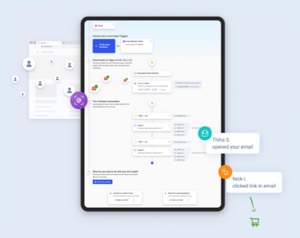
See Who Is On Your Site Right Now!
Get names, emails, phone numbers & more.
Try it Free, No Credit Card Required
We want to give you more than just strategies—we’re here to provide clear, actionable steps that help you understand anonymous visitors and set you up for success.
Guide Overview
- What Is Anonymous Visitor Identification?
- How To Identify Anonymous Website Visitors
- Anonymous Visitor Identification Trends
- Key Hurdles In The Marketing Landscape
- Benefits Of Anonymous Visitor Identification
- How Anonymous Visitor Identification Can Enhance Lead Generation
- How To Increase Sales By Identifying Anonymous Visitors
- Success Story
What is Anonymous Visitor Identification?
To start, we need to understand what anonymous website visitor identification is. It breaks down as follows:
Anonymous visitor identification is the process of identifying and understanding the companies and individuals visiting your website.
When an anonymous user lands on your site, visitor identification tools tell you who they are — their name, their email, their phone number, what page they landed on, and much more. They are no longer anonymous!
How Do I Identify Anonymous Visitors on My Site?
To turn anonymous website visitors into known users, you need the right tools and technologies.
That’s where the Website Visitor ID X-Ray Pixel comes in. By placing this pixel on your site, you can begin identifying who is coming to your site.
To install the Website Visitor ID X-Ray Pixel, sign up (for FREE!), go to your dashboard, and navigate to My Automations.
Select + New Automation and get your pixel. We have easy install options for Google Tag Manager, WordPress, and Shopify, or you can install the pixel manually.
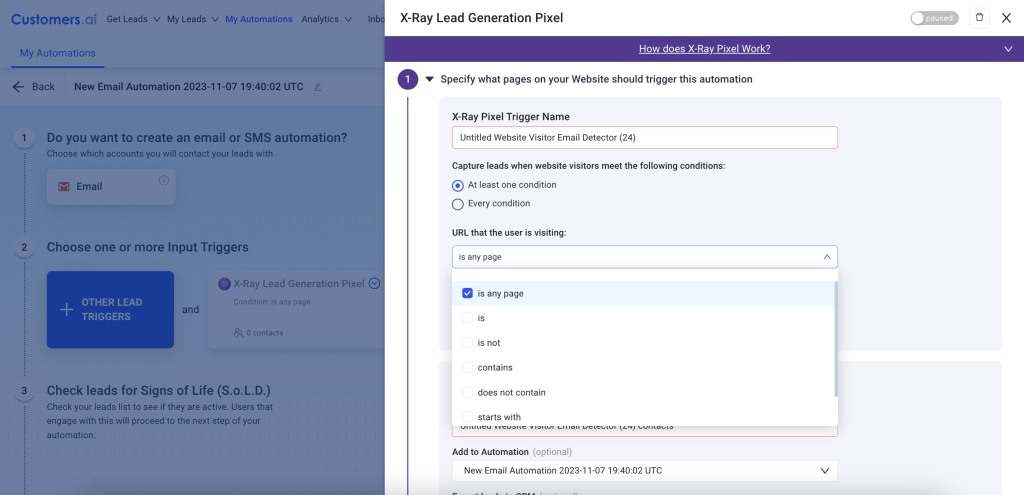
Once your pixel is set up, you can verify it’s working right on the same screen. Sounds simple enough right?
Key Trends in Anonymous Visitor Identification
As we explore the key trends in visitor identification, it’s essential to grasp the magnitude of the challenge.
As we already noted, a staggering 98% of website visitors remain anonymous, withholding their valuable information. So what does this mean for marketers?
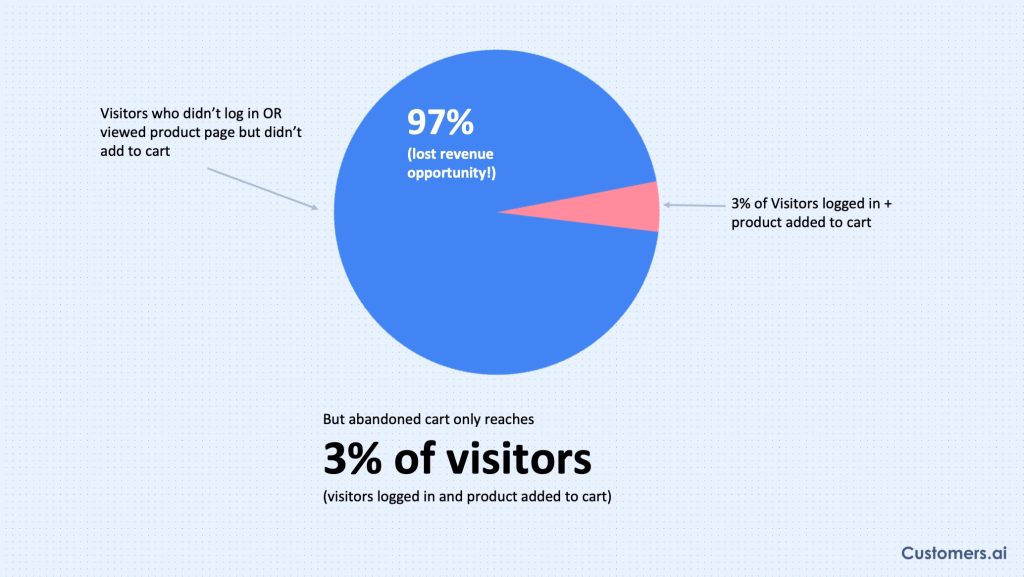
1. The Evolution of Data Analytics and Tracking Technologies
The landscape of data analytics and tracking technologies is undergoing a seismic shift, making website visitor identification essential.
The introduction of GA4 signified a fundamental change, requiring businesses to adapt to new event-tracking methodologies and a more user-centric model while recent privacy changes instituted by Apple, notably ATT and LTP, pose significant challenges for marketers in tracking and identifying website visitors using Apple devices.
These changes emphasize the need for adaptive strategies and for marketers and advertisers to think outside of the box when it comes to reaching their target audience.
2. The Rise of AI and Machine Learning
AI and machine learning algorithms are revolutionizing how businesses identify and engage with website visitors. These technologies go beyond traditional methods, offering not just predictive insights into user behavior and preferences, but also telling you who your visitors are!
By leveraging AI and ML, marketers gain a deeper understanding of their visitors, allowing for more personalized and targeted interactions.
3. Personalization and Cross-Device Tracking
The landscape of personalization and cross-device tracking is grappling with unprecedented challenges due to recent privacy changes. Notably, with iOS 17 stripping click IDs, the once-viable cross-device tracking has become an intricate puzzle for marketers.
Simultaneously, these privacy measures, while safeguarding user data, paradoxically diminish the size of targeted audiences and impact retargeting effectiveness on platforms like Google Ads and Facebook Ads.
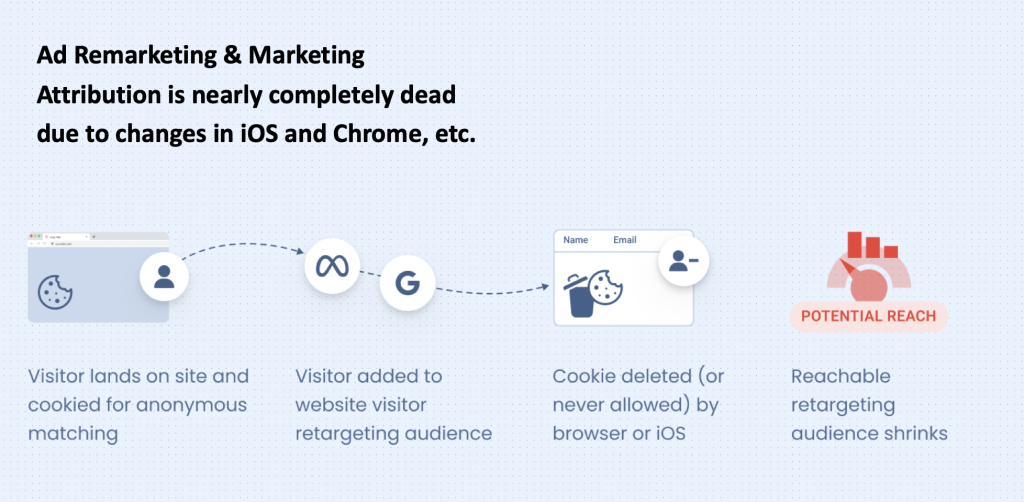
Navigating this delicate balance between privacy and personalization becomes increasingly intricate, forcing marketers to reassess strategies and adopt innovative approaches to engage their audiences.
Navigating and Overcoming Key Hurdles in the Anonymous Visitor Space
Along with understanding the trends, we also have to understand the key challenges impacting marketers.
- Intense Competition and Market Saturation: With a superabundance of online stores and businesses vying for consumers’ attention and wallets, it’s becoming more and more difficult for businesses to differentiate themselves. You have to find innovative ways to stand out, whether through unique branding, personalized customer experiences, or strategic partnerships. Marketers need a keen understanding of the target audience and a commitment to delivering value that goes beyond just the product.
- Rapid Technological Advancements: The rapid evolution of technology has transformed the way consumers interact with online platforms. Businesses are constantly challenged to keep pace with emerging trends – think voice search, augmented reality, AI – while at the same time trying to learn new platforms and navigate the on-going changes on existing platforms.
- Data Privacy and Security Concerns: In an era where data breaches and privacy concerns make daily headlines, tech giants are digging their heels in on privacy, making it harder and harder to reach customers. Between cookie updates from Apple or email changes from Google and Yahoo, a focus on consumer privacy is adding a new layer of complexity.
- Omni-Channel Customer Experience: We know the customer journey is not what it used to be. It is now extremely multi-faceted, involving interactions across various channels, both online and offline. Businesses have to create a seamless omni-channel experience that ensures consistency and cohesion throughout the customer’s journey. Coordinating marketing and sales efforts across platforms, integrating data from different touchpoints, and optimizing the user experience regardless of the channel are all critical.
- Adapting to Shifting Consumer Behavior and Preferences: Consumer behavior and preferences are continually evolving, driven by factors such as cultural shifts, economic changes, and global events. You have to be agile and responsive to these shifts to stay relevant. This requires a deep understanding of the target audience, ongoing market research, and a willingness to adjust strategies as needed.
These challenges are real and they are changing how you have to think about your marketing and sales efforts. Evolve or die, right?
So where do the anonymous website visitors come in?
Unidentified visitors represent a concealed opportunity that has been in plain sight all along, and the key lies in identifying them. Anonymous visitor identification unlocks the door to enhanced personalization, better marketing, and helps address the challenges we just explored. More importantly, it empowers you to boost sales.
Convert Website Visitors into Real Contacts!
Identify who is visiting your site with name, email and more. Get 500 contacts for free!
5 Key Benefits of Anonymous Visitor Identification
Unlocking the potential of website visitor identification brings a host of strategic advantages. From elevating the user experience to driving higher conversion rates and sales, the benefits are kind of endless IMO. If you aren’t convinced though, let’s take a look.
1. Enhanced User Experience Through Personalization
According to McKinsey, companies that get personalization right have the potential to generate 40% more revenue.
Capturing crucial website visitor information enables marketers to craft a highly personalized user experience and in turn — generate more revenue!
What’s an example of personalization in action?
With a website visitor identification tool like Customers.ai, you can track users by page. So let’s say Visitor A came in on a page for high heels. You can now create a segment for all individuals who visited the high heels page and ensure you are serving them ads for that particular product category. Visitor A along with everyone else looking for high heels is now being targeted with exactly what they were looking for.

This level of personalization not only enhances user satisfaction but also increases the likelihood of a conversion, creating a more meaningful and engaging journey for every individual interacting with the site.
2. Improved Conversion Rates and Sales
An invaluable aspect of website visitor identification lies in its ability to generate warm leads. Unlike individuals encountering your brand for the first time, identified website visitors bring a level of familiarity that significantly enhances conversion potential.
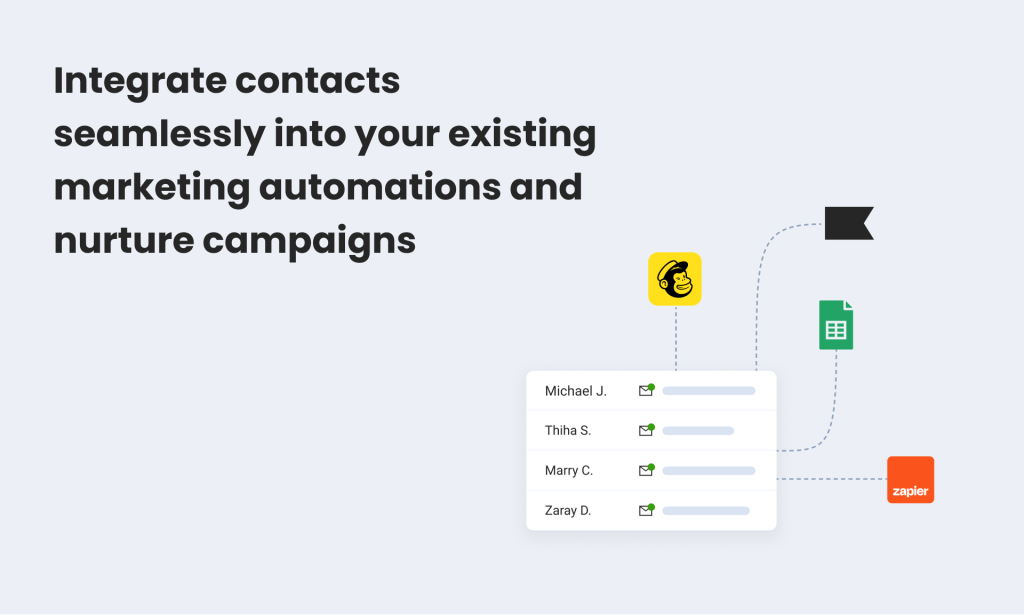
Leveraging this familiarity, marketers can tailor their strategies to engage with visitors who already have a connection with the brand, ultimately fostering a higher likelihood of successful conversions and sales.
3. Better Email Deliverability and Engagement
How many times have you received an email and thought, why am I getting this? And then…spam.
But what about the email from the store you just left or the cart you abandoned? You care about that one!
Anonymous website visitor identification plays a pivotal role in elevating email deliverability and engagement. It ensures email communications are tailored to individuals who are already familiar with the brand.
By honing in on this connection, marketers can deliver content that genuinely speaks to the interests and needs of their audience, ultimately fostering stronger relationships and driving better email performance.
Convert Website Visitors into Real Contacts!
Identify who is visiting your site with name, email and more. Get 500 contacts for free!
4. Competitive Advantage and Staying Ahead of the Curve
By staying ahead of the curve in understanding and engaging with website visitors, marketers can anticipate and respond to evolving market demands more effectively than competitors.
This proactive approach not only enhances brand visibility but also allows businesses to tailor their strategies based on real-time insights, creating a dynamic and responsive marketing framework.
The ability to glean valuable information from your website visitors grants businesses the upper hand, ensuring they stand out.
5. Larger Retargeting Audiences for Google and Facebook Ads
We’ve already discussed recent privacy changes and unfortunately, two of the hardest-hit marketing channels are Google Ads and Facebook Ads. After all, how can you retarget people if you can’t tell they’ve been on your site?
Anonymous website visitor identification emerges as a strategic solution to this challenge. By capturing and utilizing identified visitor data, marketers can not only counteract the impact of privacy changes but also expand retargeting audiences significantly.
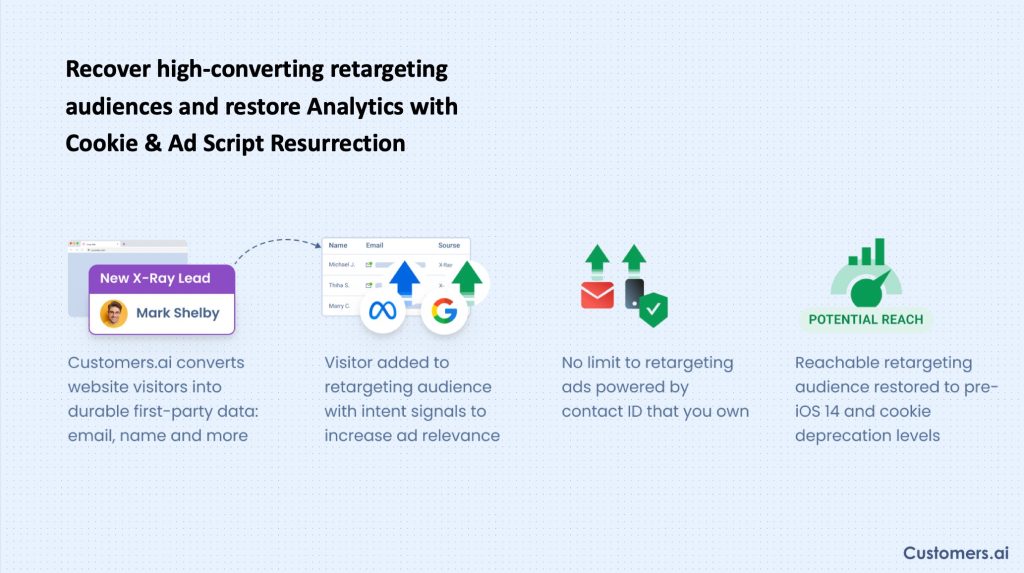
Take your website visitor lists and use them to create custom audiences on Google and Facebook.
As mentioned above, you can also create different segments, allowing you to put money toward targeted and effective campaigns.
How Anonymous Website Visitor Identification Can Help Lead Generation
Visitor identification is a powerful tool that goes beyond merely tracking website traffic—it’ll supercharge your sales efforts.
Here are five key ways in which website visitor identification can elevate your lead generation game:
1. Building High-Quality Email Lists
The absolute best part about website visitor identification is it enables you to capture the email addresses of your users.
By identifying individuals who have engaged with your content or shown interest in your products/services, you can build targeted and high-quality email lists.
You can also break those lists into specific segments and make your targeting even more spot-on!
2. Personalized Content for Targeted Outreach
Understanding the specific pages your users interact with allows for highly personalized content and highly personalized outreach. With website visitor identification, you can tailor your messaging based on the interests and preferences of individual visitors.
This level of personalization significantly enhances the relevance of your content, making your outreach more compelling and increasing the likelihood of converting leads into sales.
3. Identifying Warm Leads for Strategic Follow-ups
Look, we know that not all leads are created equal. One of the best things about website visitor identification is it helps you distinguish warm leads from cold ones.
By analyzing visitor behavior, such as repeated visits to pricing pages or engagement with specific product/service information, you can identify leads exhibiting purchase intent.
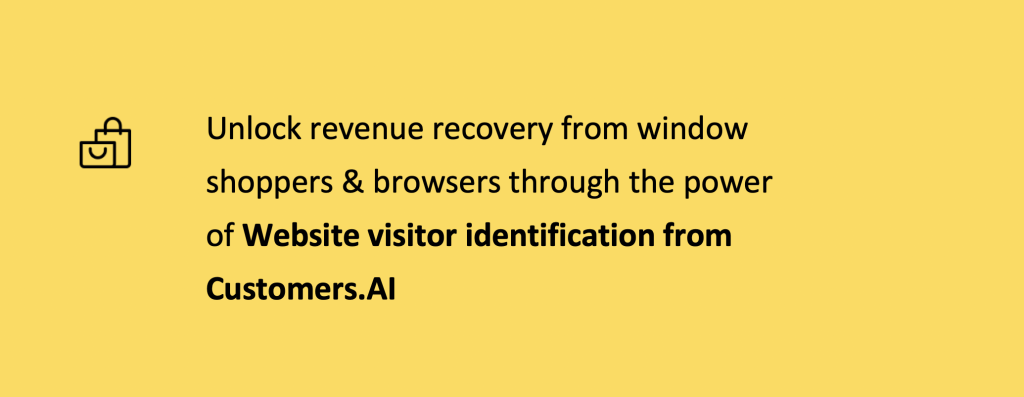
This insight allows your sales and marketing teams to prioritize follow-ups, focusing their efforts on leads more likely to convert. Seems like a good thing right?
4. Optimizing Landing Pages for Conversion
We use analytics to understand how users are interacting with our websites. It’s why we also use eye-tracking tools and heat maps and A/B testing software. We just want to know what people are doing on our site.
Website visitor identification can provide valuable data on how visitors interact with not just your site, but also specific landing pages, allowing you to pinpoint areas for improvement and optimize landing pages to enhance conversion rates.
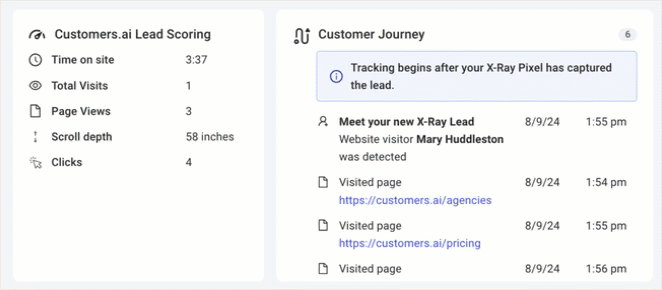
Whether it’s adjusting the layout, refining your call-to-action (CTA), or tailoring content based on visitor segments, these optimizations can have a direct and positive impact on sales by creating a more seamless and compelling user experience.
5. Enhanced Retargeting Strategies
We’ve said it before and we’ll say it again – anonymous visitor identification lays the foundation for robust retargeting strategies.
By identifying individuals who have visited your site but haven’t taken the desired action, you can deploy targeted retargeting campaigns. These campaigns, whether through display ads or social media, keep your brand in front of potential leads, nurturing them through the sales funnel and increasing the chances of conversion.
Incorporating website visitor identification into your lead generation strategy not only brings efficiency but also precision, ensuring your efforts are focused on the most promising prospects. You can create a more personalized and effective process that drives meaningful results for your business.
How to Increase Sales by Identifying Anonymous Website Visitors
Identifying your anonymous visitors and leads is great but if you don’t know what to do with the information, you can’t be successful.
Let’s look at how you can use website visitor data to make informed decisions and improve your marketing efforts.
1. Precision Targeting
One of the foremost advantages of utilizing a website visitor identification tool is the ability to precisely target your audience. By understanding the demographics and behaviors of your visitors, you can tailor your marketing campaigns with laser-like precision, ensuring that your message resonates with the right people at the right time. For example:
- Behavioral Insights: Utilizing anonymous visitor data allows you to track user behavior, such as pages viewed or purchase intent. This data can then be used to create email or retargeting campaigns based on those behaviors.
- Demographic Segmentation: Anonymous visitor identification tools enable you to categorize visitors based on visitor demographics. If you sell winter coats, your message to visitors in Florida is going to be different than your message to users in Maine.

This leads to better messaging and a better customer experience. Plus, 80% of companies that use market segmentation report increased sales.
- Timing and Frequency: Understanding the time of day or week when anonymous visitors are most active allows for strategic timing of marketing messages. When are customers visiting your site? When are they opening their emails? In a world where the average person sees 10,000 ads in a day, you have to find a way to stand out.
2. Enhanced Personalization
Personalization drives growth. Companies that grow faster drive 40% more of their revenue from personalization than their slower-growing counterparts. There is real money in personalization.
Visitor identification provides a new level of personalization in your marketing efforts.
Think about it: in a typical scenario, a person comes to your site, they browse around for a bit, and they leave.
If they clicked an ad to get there, you have data that can be used for remarketing but if they only subscribed to your blog or filled out form for a coupon code, you have no idea what they actually want. Even worse, what if they didn’t take any action that gives you information about their intent? There is no option for personalization!
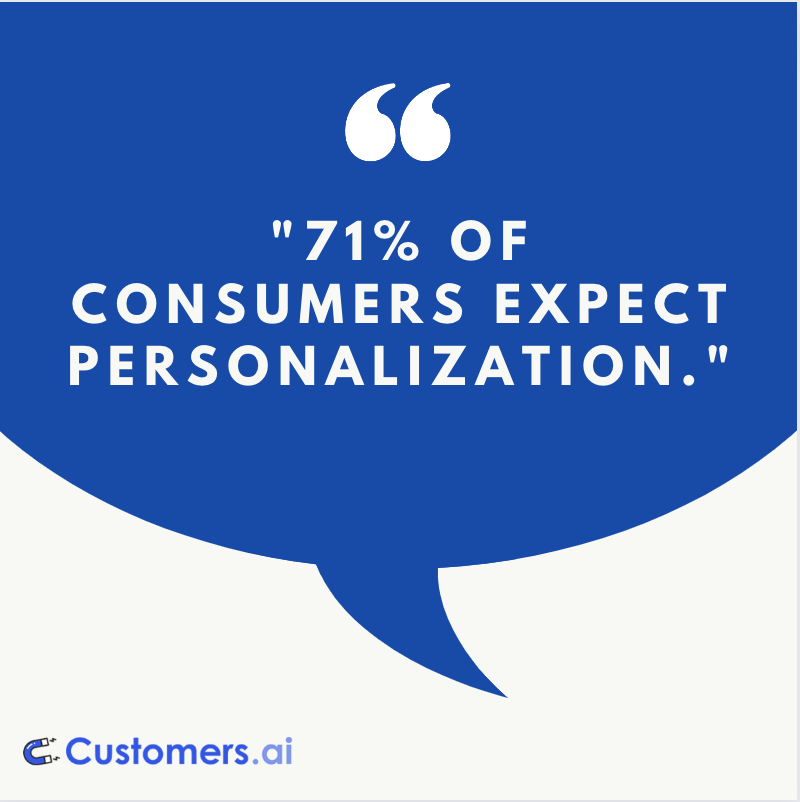
Anonymous visitor identification gives you detailed insights into individual preferences and past interactions, allowing you to create highly personalized experiences for each visitor. And with 71% of consumers expecting personalization, it’s your job to give them what they want.
3. Streamlined and Efficient Marketing
Efficiency is the key to successful marketing, and customer identification plays a pivotal role in streamlining your efforts. With a clear understanding of your audience, you can optimize your marketing channels, focus on high-potential leads, and allocate resources where they will yield the greatest return on investment.
Here’s how:
- Seamless Integration of Data: Identifying anonymous visitors allows you to seamlessly integrate valuable data into your marketing ecosystem. By consolidating insights on user behavior, preferences, and interactions, your marketing efforts gain a cohesive foundation, ensuring your messaging aligns with the unique attributes of each visitor and fostering a more meaningful connection.
- Targeted Content Delivery: Understanding the demographics and behaviors of your anonymous visitors empowers you to tailor content. Create targeted campaigns that speak directly to the interests and needs of specific audience segments. Whether it’s curating product recommendations or crafting compelling narratives, the ability to deliver content tailored to individual preferences enhances the overall customer experience.
- Automated Campaign Optimization: Automation is key to efficiency. Anonymous visitor identification enables the creation of automated workflows that respond dynamically to user interactions. From triggered emails based on specific actions to personalized offers aligned with individual preferences, automation ensures that your marketing stays agile and responsive without constant manual intervention.
- Efficient Resource Allocation: By focusing on identified anonymous visitors, your marketing resources are allocated more efficiently. Rather than employing a one-size-fits-all approach, targeted campaigns reduce waste and amplify the impact of your efforts.
- Enhanced Customer Journey Mapping: Anonymous visitor identification provides the missing pieces of the puzzle in mapping the customer journey. With a clearer understanding of touchpoints, preferences, and engagement levels, you can refine your customer journey map for enhanced coherence.
4. Warm Outreach and Relationship Building
Knowing your customers allows you to initiate warm outreach strategies. By reaching out to potential customers who have expressed interest in your products, you can build a connection and nurture relationships. This approach fosters trust and increases the chances of turning a casual visitor into a loyal customer. It leads to:
- Personalized Communication Initiatives: Identifying anonymous visitors allows you to infuse a personalized touch into your communication initiatives. Leverage the data to tailor outreach messages that resonate with individual preferences. This ensures tyour communication feels relevant but also genuinely tailored to the individual. Whether it’s a personalized email campaign or targeted social media interaction, the ability to speak directly to the needs and interests of your audience fosters a sense of connection.
- Strategic Follow-Ups Based on Visitor Behavior: As we mentioned earlier, the name of the game is personalization. If a visitor consistently engages with specific product categories or spends considerable time on certain pages, you can initiate targeted follow-up communications. Whether it’s providing additional information, exclusive offers, or personalized recommendations, these strategic follow-ups demonstrate attentiveness and contribute to building a rapport with the visitor.

- Responsive Engagement Across Channels: We know the customer journey spans multiple channels. In fact, the average customer hits nine touchpoints! Anonymous visitor identification ensures a responsive and cohesive engagement across this spectrum. Whether a visitor interacts with your website, subscribes to newsletters, or engages on social media, the ability to recognize and consolidate these touchpoints allows for a seamless and consistent communication flow. This unified approach contributes to a more holistic and authentic relationship-building process.
- Building Trust Through Consistent Interaction: Trust is key to sales and key to long-lasting customer relationships. Anonymous visitor identification facilitates consistent interaction, creating touchpoints that contribute to the gradual establishment of trust. By demonstrating a true understanding of who your customers are and consistently delivering value through personalized interactions, you lay the groundwork for a relationship built on trust and mutual benefit.
5. Expanded Retargeting Audiences
With retargeting lists shrinking by the day thanks to privacy changes by Apple and Google, marketers have to act fast. How can you grow your lists if you don’t know who is visiting your site? Identifying anonymous website visitors with contact info you own, can analyze, and sync to other systems is the key to unlocking the full potential of your retargeting efforts, allowing you to cast a wider net and rekindle connections with a broader audience. Here’s how:
- Audience List Enhancement: Anonymous visitor identification gives you the names and email addresses of those visiting your website. And with a tool like Customers.ai, that list can be automatically synced to platforms like Facebook to enhance remarketing campaigns. With a list that is continually updated and growing, you can reach more customers than ever before.
- Diversification of Retargeting Segments: Identifying anonymous website visitors enables the creation of diverse retargeting segments based on a range of criteria such as behavior, demographics, and engagement levels. Rather than limiting retargeting efforts to a generic audience, you can tailor segments to specific visitor attributes. For example, retargeting visitors who showed interest in a particular product category or those who spent a significant amount of time browsing your site.
- Customized Ad Content for Enhanced Relevance: Understanding the preferences and behaviors of anonymous visitors allows for the creation of highly customized ad content. Tailor your retargeting ads to align with individual interests and past interactions, increasing the relevance of your messaging. Whether showcasing products left in the cart, promoting complementary items, or offering exclusive discounts, personalized retargeting content significantly enhances the chances of re-engagement.
- Dynamic Retargeting Based on Visitor Behavior: Utilizing anonymous visitor data enables dynamic retargeting that adapts to individual visitor behavior. For instance, if a visitor showed interest in specific products but didn’t make a purchase, dynamic retargeting allows you to showcase those exact products in subsequent ads. This tailored approach not only reinforces the visitor’s initial interest but also increases the likelihood of conversion by presenting the most relevant offerings.
6. Pre-Cart Outreach
Traditional methods often hinge on visitors completing forms or progressing to the checkout stage before capturing their information. However, customer identification dismantles these barriers, enabling you to establish connections with potential customers who may not have filled out forms or abandoned their carts.
This innovative approach broadens your reach and taps into a previously untapped market, allowing you to proactively engage with visitors before they even consider adding items to their cart. By understanding the preferences and behaviors of these potential customers early on, you can implement pre-cart outreach strategies that lay the foundation for a personalized and compelling shopping experience.
A Visitor Identification Success Story: DTC Health & Wellness Brand
A DTC Health & Wellness brand used the Customers.ai Website Visitor ID X-Ray Pixel tool to identify who was visiting their site and what products they were shopping for. They wanted to know who was coming to site but not adding items to their cart or creating accounts. With Customers.ai, they got it.
They were able to identify their visitors and remarket to both those who hadn’t purchased and those who had abandoned their carts with high-converting email automations in Klaviyo.
The result?

Get Started with Anonymous Visitor Identification
Acquiring insights into your website visitors is paramount for making informed marketing decisions and generating revenue.
However, challenges arise as tech giants like Google and Apple implement stringent privacy measures, eroding click IDs and diminishing remarketing audiences.
This is where the game-changing role of website visitor identification comes into play, offering a lifeline as traditional advertising effectiveness wanes.
By understanding who is visiting your site through tools like Customers.ai Website Visitor ID X-Ray Pixel, you gain a competitive edge in personalization, conversion optimization, and strategic retargeting, ensuring your marketing strategies stay ahead in an evolving and privacy-conscious environment.
Dive into the world of website visitor identification to unlock the potential of personalized and effective marketing.
Convert Website Visitors into Real Contacts!
Identify who is visiting your site with name, email and more. Get 50 contacts for free!
Important Next Steps
- See what targeted outbound marketing is all about. Capture and engage your first 500 website visitor leads with Customers.ai X-Ray website visitor identification for free.
- Talk and learn about sales outreach automation with other growth enthusiasts. Join Customers.ai Island, our Facebook group of 40K marketers and entrepreneurs who are ready to support you.
- Advance your marketing performance with Sales Outreach School, a free tutorial and training area for sales pros and marketers.
Anonymous Visitor FAQs
How can I identify anonymous visitors with AI?
You can identify anonymous visitors using AI-powered tools that analyze website behavior, IP addresses, and cookies to uncover potential details about the visitor. These tools use techniques like reverse IP lookup, device fingerprinting, and behavioral analytics to match visitor patterns with known profiles or company data.
For example:
- Reverse IP Lookup: Identifies the organization or location associated with an IP address.
- Behavioral Analytics: Tracks on-site actions to categorize visitors into segments or predict intent.
- AI Enrichment: Combines visitor behavior with third-party databases to match anonymous traffic to company or demographic profiles.
Platforms like Customers.ai can help you go a step further by targeting high-intent visitors through retargeting ads and other marketing efforts, even if their identity isn’t fully uncovered.
What are anonymous website visitors?
Anonymous website visitors are users who land on a website but do not provide any identifiable information like their name, email, or other contact details. They browse freely, often engaging with content, clicking around, and even placing items in their cart without logging in or completing a purchase. These users remain invisible to traditional analytics tools because:
- They don’t fill out forms or create accounts.
- Their identities are not captured by cookies in many cases due to privacy settings.
- They often use incognito or private browsing modes, which limits tracking.
- They can visit multiple times, making engagement patterns hard to follow without advanced tools.
Why is identifying anonymous website visitors important?
Identifying anonymous visitors is crucial because it opens doors to valuable business insights and growth opportunities that might otherwise be lost. Benefits include:
- Lead Generation: Transform unknown visitors into actionable leads, increasing your pipeline.
- Improved Targeting: Understanding visitor profiles helps tailor marketing strategies to better resonate with interested audiences.
- Personalized Outreach: Enables highly targeted email or ad campaigns based on visitor behavior.
- Lost Revenue Recovery: Identify users who are highly engaged but did not convert, allowing re-engagement to capture potential sales.
How can I identify anonymous website visitors?
Several methods and technologies are used to identify anonymous visitors:
- IP Address Tracking: Captures location and potential business information when visitors are from corporate networks.
- Identity Resolution Software: Matches behaviors to existing databases, identifying visitors based on IP, cookies, and behavioral data.
- Social Media Integration: Connects browsing patterns with public social profiles.
- Data Enrichment Providers: Uses external data sources to provide insights on industry, company, and sometimes job roles, enhancing visitor details.
What is website visitor tracking, and how is it different from visitor identification?
Website visitor tracking monitors how visitors engage with your website: pages viewed, time on site, and actions taken. Visitor tracking is typically anonymous and gathers data to understand general user behavior, while visitor identification goes a step further by attempting to attach actual identities to specific visitors.
How does anonymous visitor identification work?
Anonymous visitor identification tools combine data from cookies, IP addresses, and third-party data enrichment to recognize patterns and cross-reference them with existing data profiles. This complex process typically involves:
- Data Collection: Captures behavioral data like clicks, time on page, and interactions.
- Pattern Matching: Uses algorithms to find matches in third-party databases.
- Enrichment: Adds details such as company, industry, and sometimes even inferred roles based on engagement.
What types of businesses benefit most from anonymous visitor identification?
Businesses with high website traffic and longer sales cycles benefit significantly from anonymous visitor identification. Examples include:
- B2B Companies: Enables sales teams to identify potential business leads.
- Ecommerce Brands: Helps recapture interest from non-purchasing browsers and cart abandoners.
- SaaS Companies: Assists in lead nurturing for potential subscribers or users who may be testing the product.
How do IP tracking tools help in identifying anonymous visitors?
IP tracking tools identify the location and, in some cases, the organization behind the IP address. These tools help businesses by:
- Company Identification: Reveals company names associated with visitor IPs, helpful for B2B lead generation.
- Geolocation Targeting: Identifies geographic regions, supporting regionalized marketing strategies.
- Behavioral Insights: Allows segmentation of visitors based on company size or industry.
What is the role of cookies in identifying anonymous website visitors?
Cookies store data on users’ preferences and behaviors, helping websites recognize returning visitors. Cookies assist in:
- Behavioral Tracking: Tracks returning visitor behaviors, such as revisiting the cart.
- Segmentation: Creates segments based on behavior, interest, or browsing frequency.
- Retargeting: Allows businesses to retarget ads on social media or search platforms.
Are there privacy concerns with identifying anonymous website visitors?
Yes, privacy is a major concern, and companies must adhere to data protection regulations like GDPR and CCPA. Responsible visitor identification involves:
- Transparency: Clear policies informing users of data collection.
- Consent Management: Allowing users to opt-out if they choose.
- Data Anonymization: Avoiding personally identifiable information unless consent is granted.
What legal considerations are there in tracking anonymous website visitors?
Legal considerations vary by region but generally include:
- User Consent: Many jurisdictions require consent for cookie use and data collection.
- Data Retention Policies: Guidelines on how long data can be stored.
- User Rights: Providing users with access to or the ability to delete their data.
How does anonymous visitor tracking differ from traditional analytics?
While traditional analytics focus on general user behaviors (like page views and bounce rates), anonymous visitor tracking aims to uncover potential identifiers about visitors. The difference lies in:
- Purpose: Analytics focuses on site performance; visitor tracking focuses on individual engagement.
- Scope: Visitor tracking gathers data about intent and potential identifiers.
- Outcomes: Analytics optimizes site usability, while tracking aims to generate leads.
What industries are most interested in anonymous visitor tracking?
Industries with high-value customer touchpoints benefit most, such as:
- Ecommerce: Identifying people visiting the site for sales.
- B2B: Identifying people visiting the site for leads
- Healthcare: Tracking engagement on informational content.
How do companies re-engage anonymous visitors once identified?
Companies can re-engage identified visitors through targeted marketing tactics:
- Personalized Emails: If emails are obtained, use customized outreach.
- Retargeting Ads: Use social or Google Ads based on engagement.
- Account-Based Marketing: Target identified companies with customized campaigns.
What data points are commonly used to identify anonymous visitors?
Common data points include:
- IP Address: Often linked to organizations in B2B contexts.
- Behavioral Patterns: Frequency and nature of visits.
- Device Type: Can help determine user demographics or preferences.
How accurate is anonymous visitor identification?
Accuracy depends on the method and data source. IP-based identification may not capture specific individuals but can reliably identify organizations. Data enrichment services increase accuracy by combining multiple data points.
Can anonymous visitor identification be integrated with CRM systems?
Yes, many tools integrate with CRMs, helping businesses:
- Enrich Lead Data: Automatically update records with visitor insights.
- Track Engagement: View all website interactions within the CRM.
- Prioritize Leads: Identify high-interest visitors based on browsing history.
What are some examples of anonymous visitor identification tools?
Tools include platforms like:
- Leadfeeder: Shows companies visiting your website.
- Clearbit: Enriches visitor profiles with business data.
- Customers.ai: Provides enriched visitor identification and engagement insights.
How do companies use anonymous visitor insights to improve marketing?
Insights from anonymous visitors allow marketers to:
- Refine Audience Segments: Identify frequent visitors and high-interest groups.
- Optimize Content: Understand which content drives the most engagement.
- Personalize Campaigns: Use behavior-based messaging for higher relevance.
How can visitor tracking impact sales strategies?
Sales teams can use this information to:
- Identify High-Value Prospects: Prioritize leads showing high engagement.
- Tailor Sales Outreach: Develop personalized pitches based on interests.
- Increase Conversions: Use insights to address specific customer needs.
What are the challenges of identifying anonymous visitors?
Challenges include:
- Privacy Compliance: Balancing tracking with user rights.
- Data Accuracy: Ensuring accurate identification.
- Tech Integration: Making visitor data usable across platforms.
How does GDPR impact anonymous visitor tracking?
GDPR impacts tracking by requiring:
- Explicit Consent: Visitors must agree to be tracked.
- Data Minimization: Only essential data should be collected.
- Access Rights: Users can request their data be removed.
Can small businesses benefit from anonymous visitor identification?
Yes, it can help small businesses by:
- Boosting Lead Generation: Capture interest without heavy ad spending.
- Personalizing Marketing Efforts: Engage identified leads directly.
- Enhancing Customer Understanding: Learn which products attract attention.
How does anonymous visitor identification support retargeting?
Identified visitor data supports retargeting by:
- Providing Targeted Ad Lists: Create audiences based on previous site interactions.
- Increasing Conversion Potential: Reach users familiar with your brand.
- Personalizing Ad Content: Tailor messages to known preferences.
How can businesses improve the effectiveness of visitor identification tools?
To improve effectiveness:
- Combine Tools: Use CRM integration, analytics, and IP tracking.
- Regularly Audit Data: Ensure accuracy and relevance of gathered data.
- Optimize Based on Results: Adjust strategies based on visitor insights.
